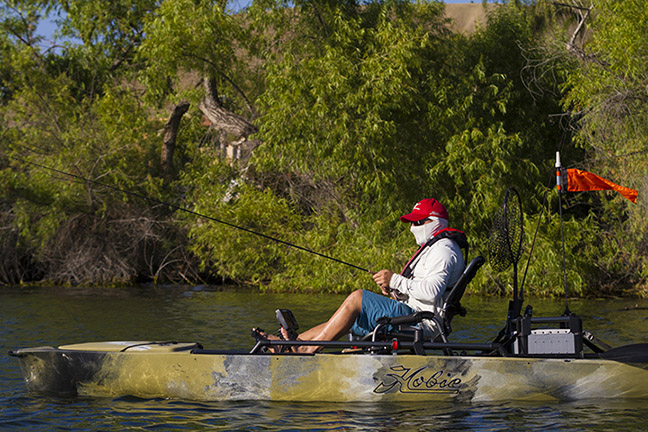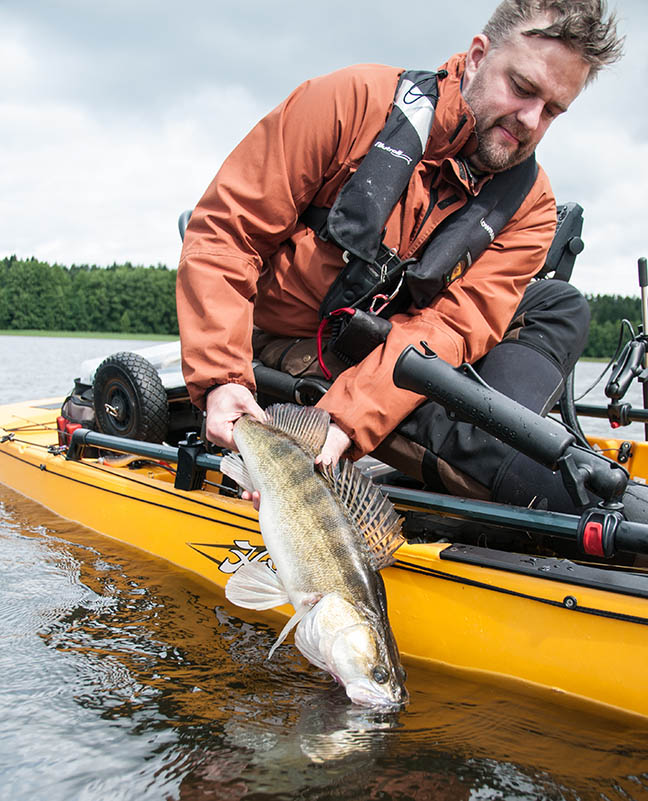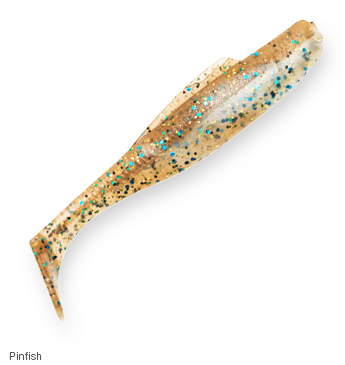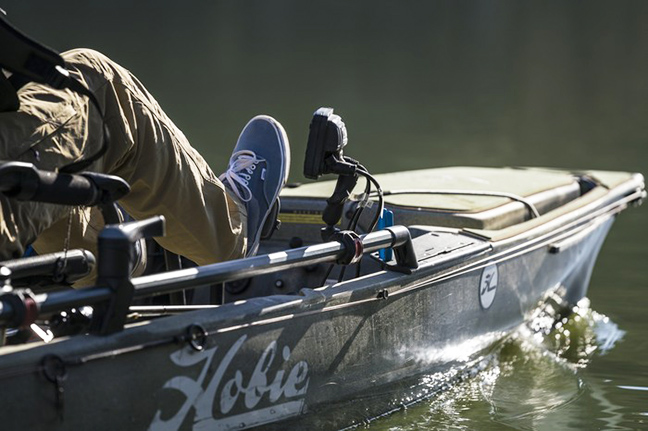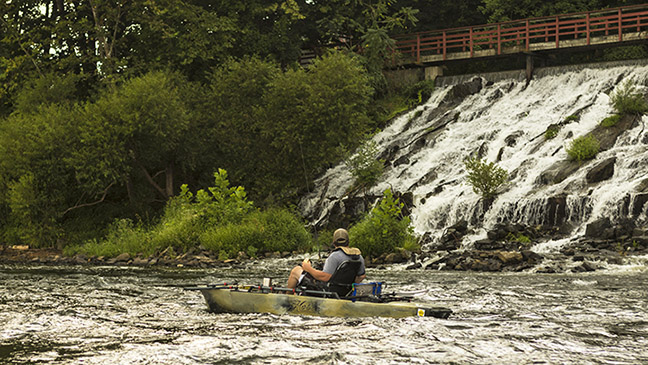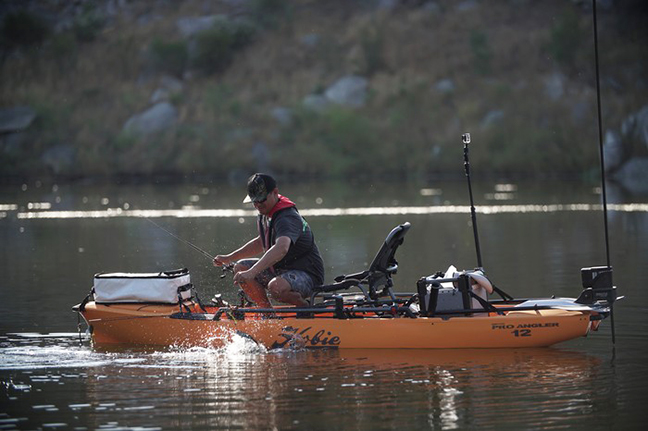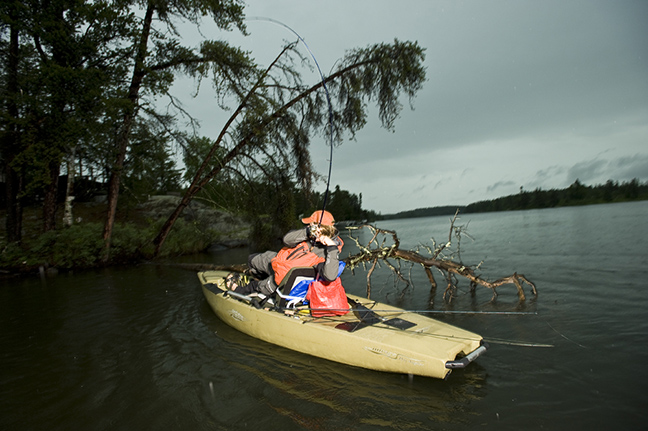River ‘Eyes by ‘Yak
Whether you’re talking the expansive rivers of the Dakotas, Minnesota, Wisconsin, and Michigan, or the reservoirs and rivers of Nebraska, Ohio, Tennessee, Arkansas, and Oklahoma, primetime walleye fishing is happening right now. In all these places, walleyes are moving to the headwaters, narrows, and dams, making them quite uncomplicated to find and catch.
A kayak is an excellent alternative to fishing walleyes by motorized boat or from the bank. Specific models like Hobie’s Mirage Pro Angler 12 or 14 and Mirage Pro Angler with 360 drive technology are ideal because they employ pedal-drives to make navigation and boat control infinitely easier in the current areas favored by spring walleyes.
Across the board, sales of all manner of kayaks are booming, because the versatile, affordable and easy handling crafts allow anglers of all walks and interests to make the most of fishing opportunities, while also abiding by new social-distancing norms.
Kayak fishing – especially in springtime’s faster currents and cooler temperatures – requires due consideration of on-the-water safety. Always wear a PFD and exercise caution. “With frigid springtime water temperatures, it’s imperative to wear a PFD and even a dry suit if possible. Also, letting someone know where you’re fishing and when you’ll return is a good idea,” says Hobie pro Kristine Fischer. “Navigating and fishing current can be tricky, so it’s important to exercise respect for the waters and keep safety first and foremost.”
Some of the best rivers for spring walleyes feature hydroelectric dams that release water and increase downstream flows when generating power. Areas just downstream of natural falls and water-retaining dams can be productive as well.
Fishing from a kayak, it’s essential to know the discharge and generation times at dams upstream, so you’ll know how much water is coming and when. Moving water is an absolute walleye magnet, and when the switch flips, the bite can heat up instantaneously. One caveat, however, is making sure you’re not too far downstream when dam gates open. The sudden current acceleration can be more than a workout kayaking back upstream.
Techniques
One of the best methods for targeting spring river walleyes is slipping the current. Find a stretch of river with plenty of classic features – points, bars, current seams, etc. Start at the top and begin drifting downstream. It’s no different than how you’d operate a motorized boat on the drift, either; point the bow toward shore and crank the rudder, so the kayak travels at the optimum angle to cast toward shore and drag a bait along the bottom.
On a controlled slip for walleyes, primary presentations are long-lining a jig behind the kayak, and casting crankbaits and jerkbaits off the bow. Both techniques can be employed simultaneously, where multiple lines are permissible. Watching over your shoulder, adjust the boat if there’s a shoreline point gravel or sandbar, or a windfall with an eddy that demands your attention. Again, pedals make it much easier to fish and control the boat because you are not continually shuffling hands between fishing rods and a paddle. Simply pedaling in forward or reverse adjusts the drift to stay clear of any obstacles, while remaining over or inside casting distance of premium spots.
A couple of particular baits are exceptional for active jigging or dragging jigs for river walleyes: The Z-Man DieZel MinnowZ and Slim SwimZ. Shiner and shad patterns produce best when simply matching native baitfish in clear-to-moderately-clear water. The exception, of course, is in dirtier water where brighter whites and patterns with vivid hues and contrasts can pay off.
For casting, work hardbody jerkbaits inside a 90-degree window off the bow, hitting targets you’re aren’t slipping across on the slip. A bait like the LIVETARGET Rainbow Smelt Jerkbait Shallow Dive is a river walleye slayer. Many rivers crown in the center and attract migrating walleyes, too, so test the center with a jerkbait if the banks aren’t producing.
Watching the river for surface irregularities can also be key. Any redirection of the current or place where ripples signify a transition to shallower water are must-fish areas. Manmade wingdams are premium features, too; look for actively feeding walleyes finning on the upstream side.
Spring is also the perfect time to throw lipless crankbaits like the LIVETARGET Golden Shiner Rattlebait. Spring often discharges flood tailraces with shad, and the LIVETARGET Golden Shiner imitates them ideally. Snap the lure with intermittent freefalls to mimic a shad that got cycled and spit out by the turbines. Tailrace walleyes are well accustomed to devouring tumbling dead bait.
Another kayak tactic is pointing the bow into the current and slow-trolling with the same jerkbaits and lipless rattlebaits. Inch along slowly and let the current take care of the bait’s action. Letting the kayak stall – falling back a foot or so – gives curious fish a longer look. Then speed-pedal ahead and prepare for a reaction strike.
The mouths of creek channels are high-probability spots, too. Watch for schools of bait schooling and rippling the surface. In some regions, it’s possible to see seagulls diving on bait.
Another method is pedaling up to the discharge area and fan-casting the edges of slack water, as well as current seams where water passes itself at two different speeds. When the water is discharged, walleyes will sit right on the edge of the fast water waiting for the influx of shiners and shad. This is a highly productive technique, just be mindful of safety, respect all posted signage, and maintain a safe distance from the discharge area.
Recommended Gear
The Hobie Rod Holder is an indispensable accessory for river walleye fishing. If you’re jigging with your right hand, place a stickbait rod in the holder – or vice versa. It’s a great way to do double duty on the river.
In terms of rods, St. Croix Mojo Bass Glass casting models prove fantastic for trolling hardbody baits, in part because their moderate actions flexes optimally in the current and sets the hook fluidly. Both the (MJGC74MM) 7’4” medium power, moderate action Crankster and (MJGC78MHM) 7’8” Big Crankster are solid models to consider. The combination with Daiwa J-Braid x8 works well to drive baits deeper and keep fish pinned. A long, three-foot fluorocarbon leader is recommended to avoid spooking fish in clear waters. Common line weights are 15- to 20-pound braid with 15-pound fluorocarbon leaders.
For jigging, a longer spinning rod of 7’6” lets you work a hooked fish around the bow, and aids in the overall playing of river walleyes. Models like the 7’6” medium-light, extra-fast Eyecon (ECS76MLXF) and the 7’6” medium-light, extra-fast SLIP-N-RIG Legend Tournament Walleye (LWS76MLXF) are great choices.
Parting Words
While bass – largemouths, smallmouths, and stripers – often get the attention on river systems coast to coast, there’s an exceptional walleye bite right now just begging for exploration. And one of the best ways to explore that bite is from a pedal-driven kayak. You’ll enjoy all the nuances of boat control you’d find in a bigger boat with a trolling motor, but with the additional conveniences of being able to launch almost anywhere, accessing waters the big rigs can’t.
Consider our advice and get on some colossal bites right now.

